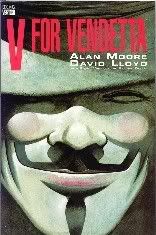Star Wars Episodes I (
"The Phantom Menace"), II (
"Attack of the Clones"), and III (
"Revenge of the Sith") picture the transformation of a Republic into an Empire. The Trade Federation, chafing against the taxation of trade routes, blockades and then invades an autonomous province of the Republic. A Senator from the province under siege persuades its Queen to make a motion for a vote of no confidence in the Chancellor of the Republic. The Senator is then elected the new Chancellor. The province gets liberated from the Trade Federation, but a new trouble begins. A separatist movement arises, which the Republic's militia may not be able to contain. The Senate gives the Chancellor emergency powers, which he uses to send a new standing army into battle against the Separatists. It turns out that the Chancellor is the mastermind manipulating both the Trade Federation and the separatist movement -- both the Trade and Separatist Wars being ruses to instill fear into the Senate, so that it will gladly relinquish its own power and centralize all power into the Chancellor's hands. In the final move for hegemony, the Chancellor orders the standing army to liquidate the militia, while telling the Senate that the militia tried to overthrow it and take over the Republic. To the grateful Senate, the Chancellor announces the dissolution of the Republic -- it will now be reorganized into the Empire. "This is how liberty dies . . . to thunderous applause." Episode III ends on a bleak note, with surviving members of the militia in exile.
We all know that two finest warriors of the remaining militia, who also happen to be gay, live to play crucial roles in raising a new Rebel militia who fight against the Empire and defeat it in Episode VI (
"The Return of the Jedi"), establishing a new Republic, but, like so much of postmodern culture, the future, capable of offering a new hope, is the past in
Star Wars.

A more likely sequel to Episode III than the optimistic Episode IV (
"A New Hope") is
V for Vendetta, which will open on "Nov. 4, which happens to be the day before the 400th anniversary of
Guy Fawkes Day" (Sarah Lyall, "From the Wachowski Brothers, an Ingénue Who Blows Up Parliament,"
New York Times,
19 Jun. 2005). V -- the first anarchist terrorist anti-hero in the history of cinema, who seeks to smash the racist and homophobic state -- is a more fitting sign of the times than a fair-haired boy from the galactic Midwest.
 V for Vendetta
V for Vendetta ends in a general insurrection.
Natalie Portman -- who plays Evey, V's protégé who learns the spirit of defiance from a lesbian murdered by the tyrannical state and eventually assumes V's identity after his death -- says of the ending: "It has a hopeful ending, because the revolution finally comes" (qtd. in Lyall, 19 Jun. 2005).
 A more likely sequel to Episode III than the optimistic Episode IV ("A New Hope") is V for Vendetta, which will open on "Nov. 4, which happens to be the day before the 400th anniversary of Guy Fawkes Day" (Sarah Lyall, "From the Wachowski Brothers, an Ingénue Who Blows Up Parliament," New York Times, 19 Jun. 2005). V -- the first anarchist terrorist anti-hero in the history of cinema, who seeks to smash the racist and homophobic state -- is a more fitting sign of the times than a fair-haired boy from the galactic Midwest.
A more likely sequel to Episode III than the optimistic Episode IV ("A New Hope") is V for Vendetta, which will open on "Nov. 4, which happens to be the day before the 400th anniversary of Guy Fawkes Day" (Sarah Lyall, "From the Wachowski Brothers, an Ingénue Who Blows Up Parliament," New York Times, 19 Jun. 2005). V -- the first anarchist terrorist anti-hero in the history of cinema, who seeks to smash the racist and homophobic state -- is a more fitting sign of the times than a fair-haired boy from the galactic Midwest.  V for Vendetta ends in a general insurrection. Natalie Portman -- who plays Evey, V's protégé who learns the spirit of defiance from a lesbian murdered by the tyrannical state and eventually assumes V's identity after his death -- says of the ending: "It has a hopeful ending, because the revolution finally comes" (qtd. in Lyall, 19 Jun. 2005).
V for Vendetta ends in a general insurrection. Natalie Portman -- who plays Evey, V's protégé who learns the spirit of defiance from a lesbian murdered by the tyrannical state and eventually assumes V's identity after his death -- says of the ending: "It has a hopeful ending, because the revolution finally comes" (qtd. in Lyall, 19 Jun. 2005).




No comments:
Post a Comment